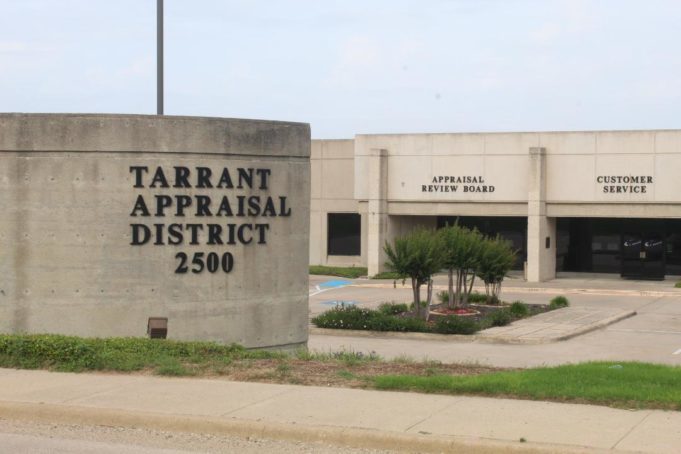The final tally of the race for the board of the Tarrant Appraisal District (TAD) could determine how property taxes and exemptions are levied for the next two years.
As homeowners readily know, North Texas home prices are booming. Residences have increased in value by around 45% in the last five years. Those increases in value, spurred by a rapidly growing population and a homebuilding market that has not kept up, proportionally increase property taxes that fund local cities, schools, and county projects.
Elections are underway for a new five-member board to head TAD, which is tasked with appraising homes and buildings and awarding property tax exemptions. Unlike other governmental boards like city councils, TAD’s board is not elected directly by citizens. The voting process is convoluted, and critics regularly allege that the system of allowing cities, the county, and school districts (i.e., “taxing entities”) to elect TAD’s governing body is intentionally designed to discourage property owners from easily following the elections.
Since early November, those taxing entities have been casting their portions of the 5,000 votes allotted them. In the last election cycle, for example, Arlington school district was given 189 votes that could have gone for one candidate or split for among several. Around a dozen candidates, including all five current board members, are running for one of TAD’s five seats.
The final tally will be determined in late December. The final votes matter because the legitimacy of ever-increasing property tax bills will depend, in large part, on the board’s ability to manage TAD’s operations ethically and within the scope of Texas law.
Within the last year alone, our news magazine has documented an attempt by Wendy Burgess, Tarrant County’s tax assessor-collector, to push to award a lucrative contract to Linebarger even though the delinquent property tax-collecting law firm did not submit the most cost-effective proposal. Generous campaign contributions from Linebarger to Burgess in the months leading to that vote may explain why she tried to circumvent TAD’s own bidding process. Accusations of rampant nepotism and the mishandling of whistleblower complaints have also plagued the appraisal district in recent years.
Local realtor Chandler Crouch is working to add transparency where there historically has been none. His website (ChandlerCrouch.com) contains several interviews with candidates. Here are a few clips from his interviews with active TAD board candidates.
TAD board member Gary Losada: I sat for six years on the Tarrant Appraisal Review Board. I was involved in hearing protests [over property tax bills]. I don’t think that I’m finished with what needs to be done at TAD. I believe the board policy manual needs to be updated. There needs to be some changes in the nepotism policy and the hiring of relatives. I have a long list of people who are related to each other at TAD.
TAD board member Rich DeOtte: I work as a civil engineer in Keller. I decided to run for the TAD board because a number of people who sit [in elected positions] used the same phrase: TAD is out of control. I think we have accomplished quite a bit. I believe in effective reform that pushes but doesn’t break the system. Now, we say the pledge and prayer at the beginning of meetings. The number of people protesting has gone up 155% in four years. The next highest is Dallas at just under 50%. That chart stands out significantly.
Rockie Gilley: I’m a lifelong resident of Tarrant County, recently retired after 40-plus years in the IT industry. I’m interested in the issue that we have with property tax appraisals and our property tax situation. When I was on city council in Kennedale, [I noticed] the abnormal number of protests we would get. Tarrant County has, if not the highest protest rates, one of the highest. That tends to indicate that there is an endemic problem. At the nut of this problem is software. I think that is something I would bring to the board.
Wes Bullock: I live in Keller. I worked in the defense industry for 30 years. I do like to see that things are done right, especially in a public arena. I’ve dealt with TAD as a homeowner and taxpayer. The little that I have dealt with them has left me disappointed. There needs to be reform at that agency. I like to see transparency. The more transparency you have, the better people feel about it. If you have had problems dealing with TAD, that’s a symptom of a much deeper-rooted problem.
James Austin: I’m a real estate broker. My friend, then-Gov. George Bush Jr., appointed me to be a commissioner for eight years. My background is in leadership. With this board, I get to use my knowledge and skills to do the best job possible. I know the pain of being a property owner. I’ve been in Fort Worth for 44 years. When it comes down to voting or looking for someone who knows what they are doing, I’ve been down there protesting my property taxes. If you feel that you have not been treated right, TAD does a good job of being sympathetic to the residents of Tarrant County. I will be someone who is experienced.
The current tally of taxing entity votes that have been case are as follows: James Austin (48), Rich DeOtte (561), Jim Griffin (7), Jungus Jordon (834), Mark Leyman (30), Gary Losada (261), Joe Ralph Martinez (655), Tony Pompa (465), Kathryn Wilemon (669).
TAD board members Tony Pompa and Kathryn Wilemon declined or were unavailable for Crouch’s interview series. Leading candidates Jungus Jordan and Jim Griffin declined to be interviewed or have yet to schedule an interview with Crouch.












